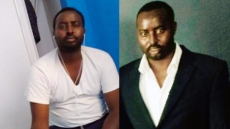LONDON — A paralyzed man was able to feed himself for the first time in eight years, after doctors implanted sensors in his brain that sent signals to his arm.
Bill Kochevar was paralyzed from the shoulders down after a cycling accident in Cleveland in 2006.
To help him move again, in 2014, doctors surgically placed two tiny implants into his brain to pick up signals from neurons from the area that controls hand movement. The signals are relayed through external cables to a computer, which sends commands to electrodes in his arm and hand muscles.
After first practicing with virtual reality, Kochevar was then able to drink coffee through a straw and eat forkfuls of mashed potatoes and macaroni and cheese on his own.
"It was amazing," the 56-year-old Kochevar said. "I couldn't believe I could do it just by thinking about it."
But after years of being paralyzed, Kochevar's shoulder wasn't strong enough to lift his arm, so doctors also provided Kochevar with a robotic arm support for extra assistance. Kochevar's case is detailed by his doctors in a paper published Tuesday in the journal Lancet.
"We know that (in paralyzed people) the spinal cord is damaged and the signals from the brain do not make it down to the muscles. And so in our system, we have effectively bridged that," said researcher Bob Kirsch of Case Western Reserve University in Cleveland, the study's senior author.
Similar technology has previously been used to help a few paralyzed people in experimental studies do things like grasp a bottle, hold a toothbrush and move their legs, but the brain and muscle implants haven't been used beyond the laboratory and are not a cure for paralysis.
Kirsch said he hopes patients like Kochevar might be able to use such technology outside of the lab within a few years, but that would require several engineering upgrades. He estimates the technology would cost tens of thousands of dollars.
Chad Bouton of the Feinstein Institute for Medical Research in Manhasset, New York, who has worked on similar projects but didn't participate in the new project, said the technology may be useful beyond paralysis.
"If we can reroute signals around a spinal cord injury, that means we've opened the door to rerouting signals around injured areas of the brain," Boutons said. "So if someone has a stroke and there's a damaged part of the brain, this technology could allow us to work around it."
Other experts said more research is needed on how to improve and possibly expand the range of movements that might be possible from such brain implant technology. Scientists have mostly focused on decoding brain signals to move robotic limbs; translating brain messages to move the body's own limbs is much more challenging and often results in movement that is a bit jerky and awkward.
"Maybe if we stimulate the spinal cord, it's possible that we can have movement that is more natural," said Gregoire Courtine, who studies paralysis at the Swiss Federal Institute of Technology in Geneva.
Kochevar, who worked in information technology, said he would love to be able to use the brain implant system at home one day.
"I'd like to be able to turn it on when I need to do something, do what I need to do and then shut it off," he said. "I'd be so excited every day to be trying new things."





